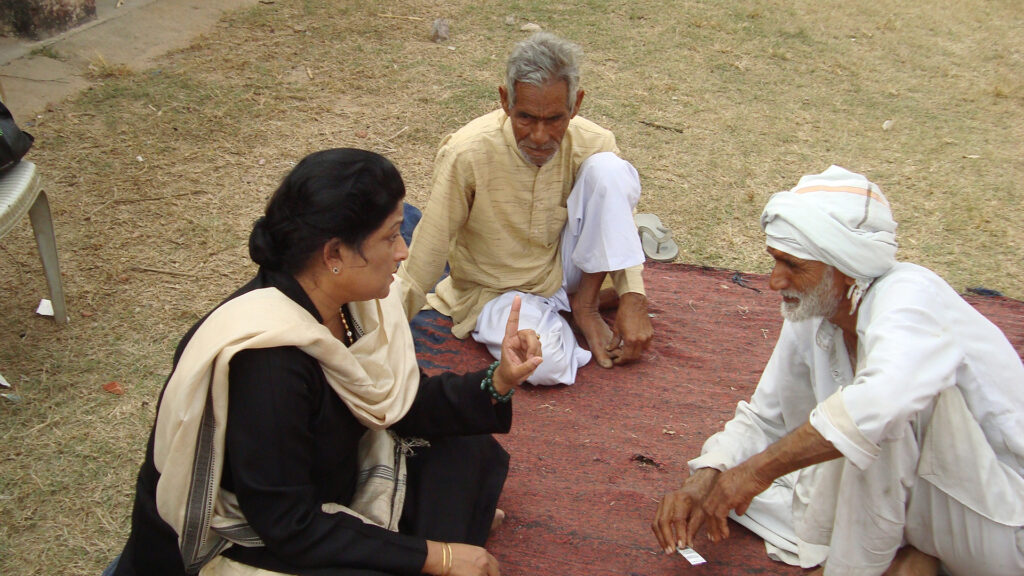by Meera Satpathy

I always go back by almost a decade to remember what really prompted me to change a career from running a business for profit to something more responsible and gratifying to my inner-self. Even today, I feel emotionally connected with the women and children of Mewat because they added unique perspectives to my thought process of designing program(s) for addressing different social issues at the grass-root level.
Nestled in the foothills of the Aravalis, and just 50 miles away from the national capital of Delhi, Mewat is home to nearly 11 lakh people (70% Muslim). Mewat is the land of the Meos, who have their genesis in the Meo tribals, who are basically an agriculture-based society. The area has a distinct ethnic and socio-cultural tract. Historically, the region has had an extremely turbulent history and has been subjected to repeated invasions. The destruction and devastation over the centuries have resulted in backwardness and gross underdevelopment both in the area and its people.
Several programs have been initiated by policy makers in India since its independence to bring about positive change in the health of the citizens of India. A huge amount of money has been spent to provide quality health services to the rural population of the country. However, there is still a large proportion of rural population that is deprived of it.
In the the matrix based on which districts could be measured on a real-time basis for improvement, Mewat has come last among 100 or more districts on a national survey, much to the surprise of all policy makers. Mewat lags districts from UP, Bihar, Rajasthan and MP (traditionally clubbed as BIMARU states) as well as Naxal-inflicted districts like Bastar and Gadchiroli in Chhattisgarh. But why is Mewat in Haryana the worst performing district in India?
Only 27.3% children between the age group of 6 months and 59 months have received vaccinations in the district and a whopping 69.5% women have anemia. Nearly 40% women between 20 and 24 years were found to be married before the age of 18 and the percentage of institutional deliveries was found to be as low as 37%.
My long association with Mewat started in 2001 when Sukarya began direct implementation of its health care program intervention in the cluster of villages in Taoru and Nuh blocks with the total population of more than 50,000. One of the important learnings of our first-hand experience of working on health and reproductive rights issue in communities of Mewat and Gurgaon districts of Haryana was the criticality of viewing efforts at improving women’s health as closely entwined with larger issues of social and economic backwardness of women in traditionally male-dominated societies.

So, Sukarya’s project objectives have focused on male partnership and participation in improving the overall health status of rural communities. The thrust of the project always focused on health education and awareness. Male health groups have played a key role and would provide platform for health education to identify health issues and problems and to take actions at the ground level for seeking health products and services.
As we all know, poverty and health are connected. The accessibility of health among other social resources is conditioned by several other economic, social and cultural determinants. Women in the rural areas of Haryana have little control over their lives. They have little power to take part in decision making in family matters. Dependency on male members of the family can be observed in almost every sphere of their lives including their health. In part women’s low status in the family and lack of decision-making power can be ascribed to her almost complete economic and social dependency on men.
It was therefore clear that the impact of any stand-alone women ‘health’ program devoid of interventions that address the other associated socio-cultural and economic determinants impacting accessibility would be largely circumscribed.Thus, over the years the focus of Sukarya’s efforts has shifted from exclusive ‘health’ programs to programs focusing on social and economic determinants impacting health outcomes. With the intention of dovetailing economic and social empowerment intervention with ‘direct’ health programs; Sukarya has enlarged its programmatic area to include income enhancing livelihood supporting initiatives for women.
As a grass-root level NGO, we always work in collaboration with government agencies, village heads, community leaders, Anganwadi and Asha workers but depend on support from individual donors, foundations and corporations. We always undertake projects for at least three years to make it sustainable. Given an opportunity with consistent support from businesses and Corporations as part of their CSR, Sukarya will go back to Mewat while expanding to other areas with its programs and services on Maternal Child Health & Nutrition. Sukarya aspires to make Mewat a successful district, a model for others to follow.
